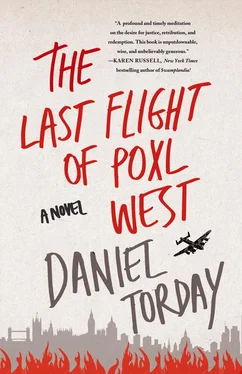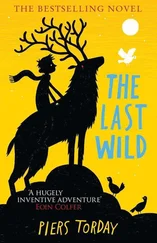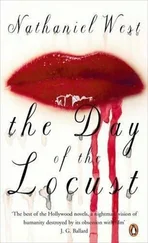3.
I was confined to six months in an army hospital outside London. Clive and my cousins were able to visit on weekend passes from their respective areas of service — Johana and Niny had joined the WAAF, each working the radios at RAF Turnbull. Niny herself had visited three or four times before I’d recovered enough — frankly, before I was weaned from morphine enough to converse coherently — to wonder aloud about the most conspicuous absence of that time: Glynnis’s having failed to come see me.
“Poxl,” Niny said. “Poxl. I’ve been waiting until you were lucid.”
A Luftwaffe bomb had struck Glynnis’s hospital, she said. Just three weeks prior. Papers reported three nurses had died, all of them “very suddenly.”
Glynnis.
The sill of the window by my bed bore no flowers. I was glad. It was the only thing that made me glad. Creeping up at the edges of my mind were those hollyhock blossoms the last moments when I saw Glynnis, the black ant crawling about them. I had told her that day that when I returned from my service I might marry her. I don’t know if I meant it then, and I don’t know what I would have done had she survived the war. Now I was not even well enough to attend her wake.
Niny left me that afternoon. I was alone for days with my thoughts of Glynnis, thoughts of my dreams both of her and of flying a Spitfire dashed. During the night I beckoned the nurse to increase my morphine. Like my mother, Glynnis was gone. Like those women I’d known in Rotterdam, Glynnis was gone. No occasion marked her passing. In the nighttime’s opiated haze, the cold, wet air that lifted off cave walls touched my cheeks again. During the days I did my best to achieve coherence. On one of her many visits, on a day of decreased morphine, Niny brought me my own edition of the Shakespeare plays Mrs. Goldring and I had read aloud to each other on so many occasions, and while the book itself held the same words as Mrs. Goldring’s copy, this version was somehow inferior. Still I read. Now Niny herself took up the parts opposite mine. That seemed appropriate.
What I can tell you from that period is that when I was lucid, each time I watched Hamlet fail to express his love before Ophelia’s horrid act; each time Niny read to me the last lines we hear from Desdemona before Othello’s green-eyed monster overtakes him; even in those moments when Jessica is courted on the periphery as her father is forced to give up his pound of flesh — each time I began to have an image return to me, one that grew stronger at night. In the cobblestones of memory, cobblestones that had been relegated to that part of memory where image cannot gain purchase, swimming images began to return, and chief among them was Françoise’s face. My thoughts were so given over to what I’d lost in Glynnis’s death, it took me some time to realize that when Niny left and the sun settled below the horizon outside and I absconded to the half-life of my morphine drip, it was not only Glynnis Goldring’s face that arose in mind. There was another face that came, too, returned to me with the atavistic pull of a love that won’t leave. Perhaps it seems indiscreet to say that it was not only Glynnis’s face I saw then, in the days just after her death — when I should most have been mourning — or too honest. Cold even.
But nothing bears truth so wholly as the truth love tells. And as Françoise’s face arose in my memory the gravity of my leaving her in Rotterdam began to pull me deep into its grasp. I’d had few moments since I arrived in London to sit with my thoughts. Now that I was confined to a hospital bed, I had nothing but them. Regret, remorse —these are not the right words here. But Glynnis was gone and I’d left Françoise without so much as a good-bye. Gravity is a funny word here, as the gravity of it began to push so hard, it seemed it might grind me to dust as I lay in that bed.
4.
My lungs took a long time to come around. Once they did I was forced to endure a painfully slow convalescence. It would be many months before I could fly. By then, war had advanced under its own ineluctable motion. News of bombing successes came by radio every evening. Soon Bomber Command had entered what would come to be known as the Battle of the Ruhr. RAF bombers opened the western border of Germany in what we all prayed was the prelude to a land invasion. The United States joined the war. I was only half-conscious of this moment when we could begin to feel all that hunkering down in London, living in Underground stations and driving the battered streets seeking survivors, fleeing to the east to live like our ancestors in caves paid proper recompense.
Once I was back on my feet I was posted again to 100 Squadron. Our aerodrome had been relocated to a small town not far to the north of the very port at Grimsby where I first arrived in England. Within my first months of returning to the cockpit I began my training on a four-engine Lancaster. This required me to log months more air time — flying a bomber was very different from piloting a Spitfire. It was a bit unusual, this move from a fighter to a bomber, but the focus of the air campaign had shifted in those months I’d spent in convalescence. Bomber Harris had grown obsessed with a blanket-bombing attack on virtually every German city, and the RAF needed all the bomber pilots it could muster. Soon enough, my initial disappointment at not returning to a fighter was quickly erased by my relief to be flying again.
Soon I came to know the crew members with whom I’d be flying. Our rear gunner, Parkington, was from Manchester. He took the first afternoon of my arrival to show me our surroundings — the Nissen hut where I was to sleep, a billeted country house we used as mess — and that evening Parkington took me along to a pub called the Rooster’s Peck, where lately we would often find ourselves in those languid days just after I’d accrued my next hundred hours in the air, awaiting flight briefings.
After we’d had a few, our navigator and flight engineer, a pair of Londoners both with the last name Smith, who had been educated together and had known each other for many years, arrived.
“So this is our new Polish Yid pilot,” Navigator Smith said. This Smith was a gangly agglomeration of limbs and teeth and appeared as if his only reason for not going for pilot was the sheer length of his legs. He sat in front of a warm Watney’s, elbows on knees.
I told him I would be second pilot on the first couple of runs, until I’d come to know the Lancaster enough to have a crew under my tutelage. I wasn’t a Polack but a Czechoslovak — Poxl West, a young Jew from Leitmeritz, arrived via Rotterdam to London in the interest of killing Germans.
“Tutelage!” Navigator Smith said. “Big word for a Polack.”
“But I’m not Polish. I’m Czech.”
The rest of the crew had arrived already besotted from having been to a pub down in Grimsby. My complaint was lost amid their din. On this first night I wasn’t able to discern the names of every man I was to fly with — a dozen officers from other crews in our wing had arrived along with the rest of ours. While Navigator Smith might have enjoyed poking fun, when drunken Brits got to talking I found myself swept away in a sluice of words. I receded into my warm pint and observations of these men in their dark blue uniforms.
Next morning we went to the mess for a light load before briefing for that night’s run, at 1300 hours. This being my first run, I listened to the chatter of the crewmen around me. We were to take a quick run over the Channel, to the small Hanseatic city of Bremen. Other than Bremen’s being near the northern coast of the country, this destination meant little to me. As my crew departed I came to try to get some sense of the significance of this path.
Читать дальше












